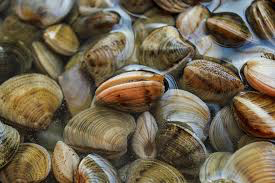HATTIESBURG, MS / ACCESSWIRE / June 19, 2019 / Climate change is one of the most pressing challenges facing the future of marine life, affecting everything from habitats, to migration, to spawning patterns. But new research shows that at least one species has unique features that have allowed it to adapt well to a warming ocean.
The study, published in Marine Ecology Progress Series, finds that surfclams are able to shift their range into previously inhospitable waters as the surrounding oceans temperatures rise. This information will be essential for fisheries managers struggling to effectively manage species in the face of climate change.
The key to this adaptability, according to authors Drs. Jeremy Timbs and Eric Powell, of the University of Southern Mississippi, and Dr. Roger Mann of the Virginia Institute of Marine Science, is the number of larvae that surfclams produce. Ordinarily, surfclams produce a massive amount of larvae, which end up distributed across a wide range of the ocean. Most of these larvae will die from predators, lack of food, or inhospitable temperatures. But the study found that, as ocean temperatures shift, the range of acceptable habitat shifts along with it. Larvae that would have died under cooler conditions now survive, gradually changing where surfclams are located.
 Atlantic Surfclams Photo Credit: NOAA Fisherie
Atlantic Surfclams Photo Credit: NOAA Fisherie
"For a sedentary species, surfclams are remarkably adaptable to ocean changes that would cause problems for other shellfish," says Dr. Powell. "This is especially important for fishermen who depend on surfclams, and who are trying to adapt with the rest of the industry to the challenges posed by climate change."
The study, which examined 30 years worth of surfclam data, was funded through the Science Center for Marine Fisheries (SCeMFiS). A collaborative project funded through a National Science Foundation grant and support from the fishing industry, SCeMFiS funds groundbreaking research around pressing scientific issues identified by our industry partners.
"Studies like this confirm what we have been seeing since the 1990s, and help us predict the industry's future," said Guy Simmons, of SeaWatch International, which is one of the largest harvesters of clams in the country. "We need to work with our partners in the scientific community as we continue to adapt to a changing ocean."
About SCeMFiS
SCeMFiS utilizes academic and fisheries resources to address urgent scientific problems limiting sustainable fisheries. SCeMFiS develops methods, analytical and survey tools, datasets, and analytical approaches to improve sustainability of fisheries and reduce uncertainty in biomass estimates. SCeMFiS university partners, University of Southern Mississippi (lead institution), and Virginia Institute of Marine Science, William & Mary, are the academic sites. Collaborating scientists who provide specific expertise in finfish, shellfish, and marine mammal research, come from a wide range of academic institutions including Old Dominion University, Rutgers University, University of Massachusetts-Dartmouth, University of Maryland, and University of Washington.
The need for the diverse services that SCeMFiS can provide to industry continues to grow, which has prompted a steady increase in the number of fishing industry partners. These services include immediate access to science expertise for stock assessment issues, rapid response to research priorities, and representation on stock assessment working groups. Targeted research leading to improvements in data collection, survey design, analytical tools, assessment models, and other needs to reduce uncertainty in stock status and improve reference point goals.
PRESS CONTACT
Stove Boat Communications
202-844-2502
[email protected]
SOURCE: Science Center for Marine Fisheries




